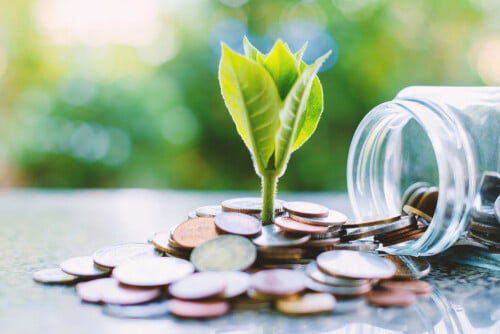I have been committed to sustainable living since I was in high school. Few people I have met can say that they shared this desire to embrace green living for their entire life. However, my passion for sustainability did not coincide with a pragmatic understanding of finance. I made a series of financial blunders that haunted me for years.
A Passion for Sustainability Must Parallel a Solid Understanding of Finance
My fellow contributors at Blue and Green Tomorrow have published a number of great pieces on the intersection of personal finance and sustainability. A lot of the posts here talk about sustainable investing. However, there are other areas of personal finance that are equally important, such as reducing consumption.
We often hear middle-aged people and seniors echo the old phrase: “I wish I knew then what I know now,” in a bittersweet reminiscence of their youth and how they handled certain situations. As much as I thought that would never be me, I feel similar when thinking about personal finance.
As a young buck with the freedom to get nearly anything I desired, I underestimated how quickly debt can spiral out of control. After many hard years of scratching and clawing, I’m finally debt-free and ready to share five personal finance tips I learned too late.
1. It’s Okay to Ask for Help
I’ve always been a self-sufficient person. I have trouble asking people for help. It’s something I’ve worked on and made progress with since my days in debt, but I used to be extremely stubborn. I chose to handle my debt on my own, even though I had people in my life who would have helped me, both emotionally and financially. I could have cut my time in debt in half, avoided thousands of dollars in interest, enriched my personal relationships and spared myself a lot of emotional torment. When I think back about my debt, the worst part wasn’t how much I owed but how alone I felt in my situation.
2. Budgeting Isn’t That Complicated
I completely avoided budgets for most of my life. The thought of creating a rigid set of rules to deprive myself of spending my money to my enjoyment didn’t resonate with my youthful mind. I’d also be lying if I said I wasn’t a little intimidated and put off at the thought of creating a budget. It felt like school. Little did I know that budgets don’t have to be granular and complex. They can be as simple as tracking five categories: housing, food, transportation, leisure and savings. If you can trim expenses in the first four categories to not exceed your means, you’ll have freed up money for savings. I wouldn’t have been able to make the type of progress on my debt had it not been for committing to a lean, five-category budget.
3. Focus on Sustainable Practices that Help Save Money
There are a lot of ways to save money by living sustainably in 2018. You can cut your gas bill sharply by biking instead of driving. You can save on electricity by using solar panels. You can save on clothes by purchasing ones made from recycled materials. Focus on these practices. You can’t just give donations to green nonprofits or practice approaches that cost money.
4. Debt Relief Services Can Work
At the height of my debt, I received a few phone calls from companies promising to make all my debt go away. One was so compelling that I almost bit (and I don’t consider myself a gullible person). These experiences shaped my perception of the debt relief industry as a bunch of quick-talking, world-promising companies trying to prey on emotionally drained debtors for a quick buck. Had I known that there are transparent companies like CEO Andrew Housser’s Freedom Financial Network that put debtor situations first, I may have opted for such a route.
Scams are still rampant, though. Two quick ways I learned to tell a scammer from a legitimate business is if the company makes you pay up front, and guarantees to have your debts forgiven. If you come across a company like this, notify the Federal Trade Commission.
5. How to Handle Creditor Calls
Of all my financial turmoil, I remember creditor interactions being the worst. If only somebody would have told me about the Fair Debt Collections Practices Act (FDCPA), which outlines what creditors can and cannot do to debtors. I specifically recall getting called extremely early in the morning, as well as calls to my parent’s house — even after I repeatedly told them to stop. Little did I know, all these things are listed as no-nos in the FDCPA. Check out the full guidelines here.
6. The Importance of Investing (Early)
Over time I’ve learned that it’s always a good idea to invest, but particularly when young. My younger self would brush this advice off, but like most things I ignored, it’s true. Investments take time to grow. Market volatility will exist no matter what, but the good years far outweigh the bad, with negative stock market returns only occurring once every four years historically. A young investor that keeps their money in the market will undoubtedly experience fluctuation, but considering that the average annualized return of the S&P 500 was over 11 percent from 1973–2016, it’s a relatively safe bet to buy and hold in the stock market.
Sometimes I look back on my mistakes and wonder about the possibilities had I been more aware. But then those thoughts are quickly extinguished by the realization that even though my debt set me back more than a decade financially, I finally made it in the green. Now I’m just thankful to owe nobody nothing and am gracious for financial freedom. If there’s anything to learn from reading this, it’s that my mistakes don’t have to be your mistakes. But hopefully, at least one of these tips can be successfully applied to your situation!
Personal Finance and Green Living Can Go Together Very Well
You can live a green lifestyle and manage your financial house properly. In fact, the two often go hand in hand. However, you have to follow the right practices.

































